Leah Clapper navigates the end of her lifelong gymnastics career
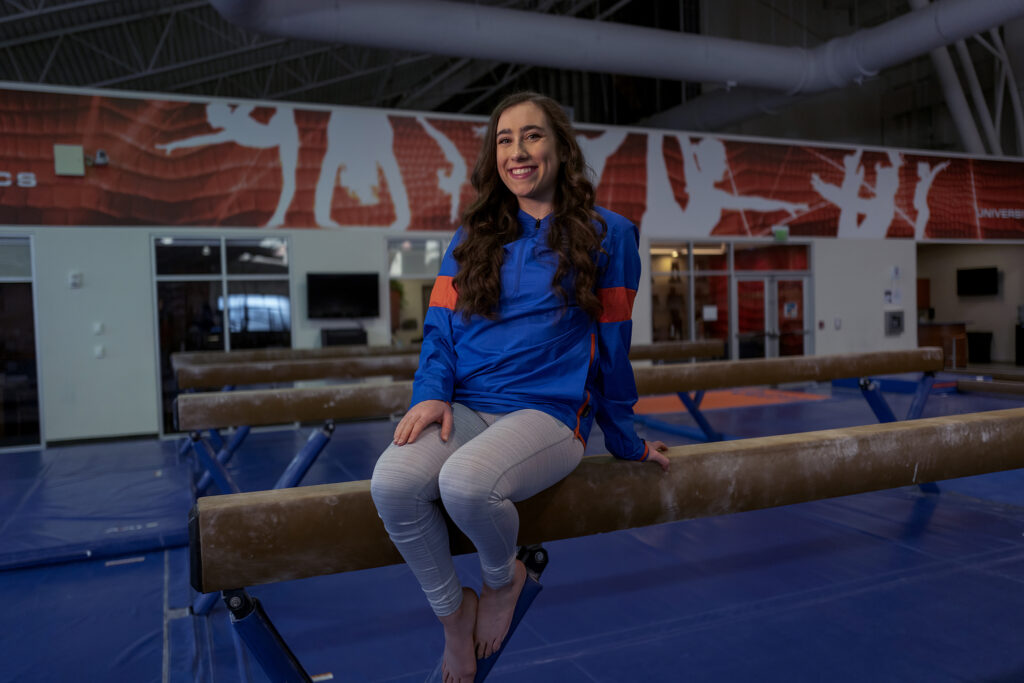
Clapper emerged as a leader of the UF women’s gymnastics team.
May 27, 2022 | Story by Chloe Greenberg | Photos by Giuliano De Portu
This article is part of Atrium’s Winter 2022 issue. To view the print edition online, visit our Issuu here.
It begins in the bathroom.
A tiled, porcelain chamber void of time and responsibility. A liminal space. A sliver of solitude and stillness where Leah Clapper takes her final deep breaths, just as she always does before she mounts the balance beam.
She stands in front of the mirror, breathing in, breathing out. It’s a procedural attempt to drown out unwelcome thoughts not long before her name is announced to the crowds. Judgment awaits her. But for now, she sees only her reflection.
She lets the cool sink water fall through the calloused hands she trusts to defy gravity. The muffled boom of a distant loudspeaker and roar of applause remind her where she is, but she knows she’s far enough away to catch her breath and expel her anxieties. The bathroom holds her still. It takes away some of the athletic pressure she’s known for most of her 21 years.
In mere minutes, Clapper will step out with her University of Florida gymnastics teammates for the Southeastern Conference championship. They traveled from Gainesville to Birmingham, in a bus heavy with concentration. Despite a history of regional and national accolades, the Gators have not placed first in six years. It might be Clapper’s last chance to grasp the coveted SEC Champion title; a test of her athletic prowess before she completes college and leaves the sport that has been her life.
Underneath the confident smiles that Clapper is known for is a sense of urgency. Staring down the final weeks of her senior year means a glimpse into a future outside of her athletic career. This competition is not only legacy-defining for the team, it’s echoing Clapper’s resolve to prove herself.
As time passes and the minutes grow shorter, all Clapper feels is an overwhelming sense of calm. One that is maybe forced, as she understands she must push away the intruding thoughts that rap at the door of her subconscious.
She needs a clear head. Empty of stress. Empty of nerves. Empty of doubt.
In her career, Clapper has flown through more than 7,000 back handspring layout layouts. The move requires the body to extend and contort while upside down to complete a full 360-degree rotation three times in a row. With her petite frame and precision, she had it perfected.
But today, repetition proves unreliable. Clapper warms up with the move, but her landing didn’t stick. She struggles to complete a move combination she thought she had mastered years ago. Was this uncharacteristic fault a sign of what’s to come? What if she’s lost her edge?
It may be her favorite event, but the balance beam is the one she fears most. The fear is unimaginable to non-gymnasts. She’s not scared of misstepping; she has a paralyzing fear of not moving at all. When the body is the tool, the instrument by which she can succeed, freezing is the biggest mistake she can make.
But she doesn’t have room to think. How can she let her mind wander when she has only inches to walk on? Her ground is unforgiving, her safety net intangible.
Rhinestones glisten on the corners of her eyes, the team’s lucky charms. Clapper grew up braiding good luck into her hair, making sure to match the number of twisted tresses around her head to that of the events she would compete in. She needed that luck now.
The moment of calm she granted herself in the bathroom has fled. The barely 5-foot-tall girl in the mirror smiles back at her, and she knows it is time.
I can do this.
Tumbling her way to Elite
The inflatable pool the Clappers kept in the basement of their Michigan home catalyzed Clapper’s gravitation toward balancing acts. She tiptoed the rim of the pool at any chance she got. She could hardly sit down long enough at mealtime. A bite of butter noodles and then a lap around the living room. A sip of juice and a flip over the couch.
The Clappers recognized their daughter had the energy of an athlete. What she needed was the structure.
Tara Clapper joined a “parent and tot” gymnastics class when her daughter was only 1. It was a perfect fit. The somersaults and cartwheels she had been doing around the Clapper household translated effortlessly in the gym. Her mom saw a love for flipping and tumbling blossom in her daughter. Never a mother to pressure or push, she gave Clapper opportunities to find herself through sport. She danced, she played tennis, ice skated and swam. But nothing came close to the weightless feeling of gymnastics.
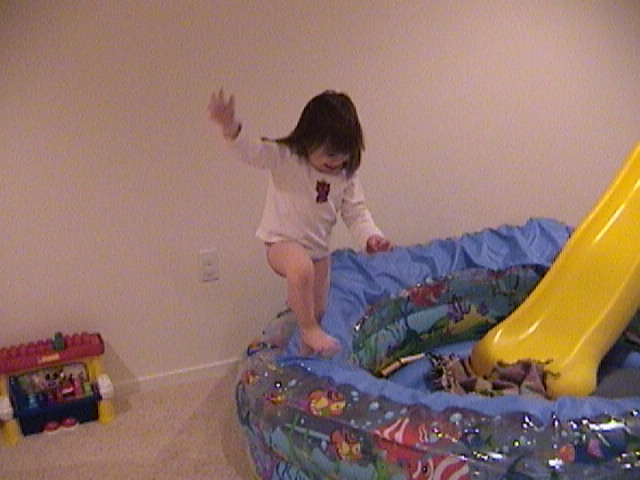
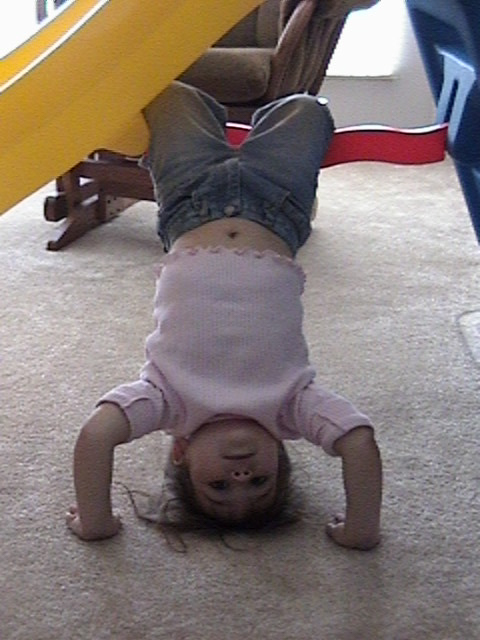
The Clappers’ home was always filled with things to climb on or leap over; all obstacles that would one day spark a love for gymnastics. (Photos courtesy of Tara Clapper)
The full-body engagement and the artistry in mastering moves fit what Clapper was looking for. Her mom saw not only potential, but determination sparking in her daughter’s eyes. The question was whether she could make it.
Mainstream gymnastics in America operates on a system of levels designed to prepare athletes for competitions determined by their skill set and performance. Once a gymnast completes all 10 levels, they have the chance to qualify for the Elite program, a classification that essentially translates to going pro.
By the time she was 6, Clapper’s mom saw her skill and began looking for a gym close to home where Clapper could learn without limitations. She picked up the phone and called Gym America, run by Claudia Kretschmer, a UF gymnastics alum.
“Do you have any level 10s at your gym?” Tara Clapper asked.
Kretschmer assumed she was speaking to just another parent who believed they had the next Olympic star sitting in a highchair in front of them. It was a call she was all too familiar with. She has always been wary of the parents choosing a life of intense sport for their toddlers after a few good notes in tumbling class. When she learned Leah Clapper was only 6, she stepped lightly, telling Tara the gym certainly had the capacity to train a level 10.
Tara Clapper listened on the other end, wondering whether Kretschmer thought she was ahead of herself. What neither knew at the time was that the 6-year-old would one day become one of the most accomplished gymnasts at Gym America.
From the beginning, Clapper stood out in her gym. Kretschmer remembers the young gymnast stretching for the high balance beam that was just out of her reach, assuring her coach she could take it on. Kretschmer and her fellow coaches even counted how many flips Clapper would do from the vault to the water fountain. She didn’t make a move without an artful tumble in between.
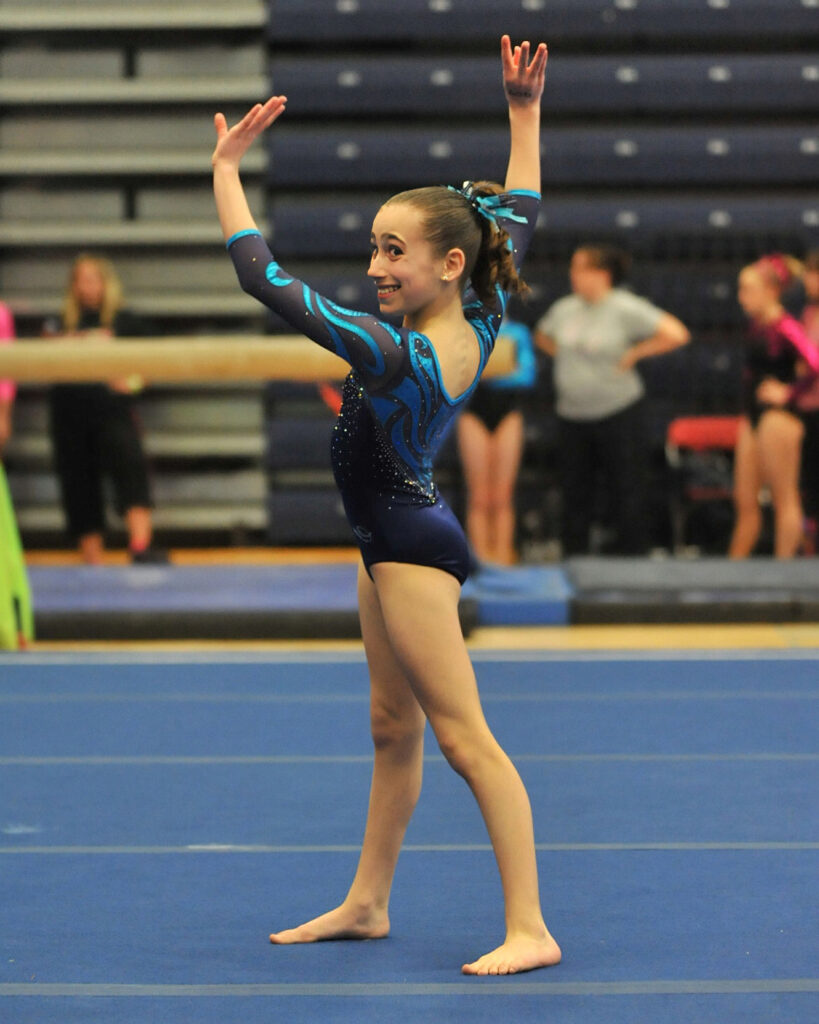
Leah Clapper’s routine smiles started as a confidence booster when she was young.
Now, they’re a part of every routine. (Photo courtesy of Tara Clapper)
Clapper immediately responded to Kretschmer’s teaching. Once a collegiate gymnast herself, Kretschmer has always gravitated toward positive reinforcement and a steady hand. She’s lived the role of the learning mentee. She knows how to impart not only lessons but confidence.
A lifetime of gymnastics led Kretschmer through a series of coaches with varying styles. Yet her biggest influence and inspiration comes not from the gym but from her sister. Kretschmer straddled two different worlds: one of gymnastics, where she pushed her body past physical boundaries, and one of disability, where she watched her sister struggle to get out of a chair.
Kretschmer brought with her this compassion toward others and their abilities when she opened her Ann Arbor gym in 1979 with her husband Ed, another UF gymnastics alum. It became the place where Clapper learned the limits of her abilities and where she would eventually push them. Between the ages of 8 and 12, Clapper trained for upward of 20 hours a week. The goal was always to go up a level and reach collegiate gymnastics.
University of Michigan gymnastics meets became a frequent family event. Olympic competition crossed her mind, but Clapper knew her happy place. She grew up admiring Olympians like Simone Biles around her, but it was never what she wanted. Kretschmer taught Clapper her comfort comes first, and her comfort was in collegiate competition.
By the time Clapper was 13, she had reached the top of the Junior Olympic program, qualifying as a level 10 gymnast. The next goal was at her fingertips; she was out for Elite level qualification.
In high school, Clapper spent nearly 30 hours a week in the gym. The intense training and self doubts almost got to her, but her steely resolve and support system held her steady. Clapper qualified to Elite level her sophomore year of high school.
Next was the collegiate dream.
Making a Gator
The hours Clapper put into her sport didn’t go unnoticed. She began presenting herself to colleges as early as her freshman year. She decided college would be the end of the road, and she wanted nothing more than to finish strong.
Collegiate gymnastics recruitment takes different shapes for different gymnasts. Clapper spent hours creating highlight compilations to sell her ability and determination to schools. The journey felt worth it when she received an offer to join the team at Penn State University. She had been denied by other schools, including UF, where she dreamed of going.
She decided on Penn State, but her future team encountered problems in 2017. Gymnastics coach Jeff Thompson was fired after he and his wife were reported to have verbally and emotionally abused their gymnasts. The accusations stirred the collegiate gymnastics world. Coaches from other universities began combing through future Penn State gymnasts, looking for talented athletes who might no longer have a place to go.
Months later, Clapper was driving her mom and sister Lily to a painting class when she picked up her phone to answer a call from Kretschmer. Her coach had news.
UF gymnastics wanted Clapper on its team. The university’s assistant coach expressed the team’s interest and asked her to visit Gainesville as soon as possible. Two days later, Clapper arrived at the campus she would eventually call home.
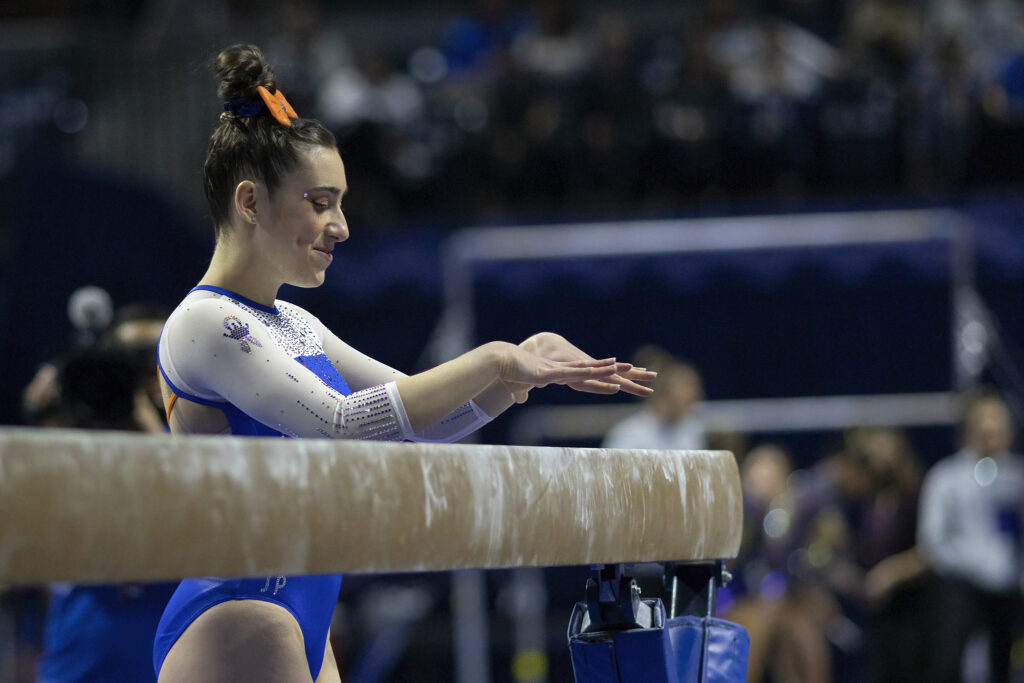
Leah Clapper’s beam win was just part of the Gators’ SEC Championship remarkable beam rotation, with every teammate scoring a 9.90 or higher.
At 17, Clapper found herself facing the myriad physical and emotional changes that came with adolescence. Balancing the girl and the gymnast had never been a struggle for her. She faced challenges and insecurities, but Clapper was unwavering in her self awareness. It wasn’t until her senior year of high school that doubt and insecurity crept up on her.
Clapper’s younger sister Lily flipped at the same gym and fostered the same goals as her. The pair shared habits. Clapper noticed her sister changed her after-dinner dessert ritual from scoops of ice cream to blueberries. What was usually a reward following days filled with school and practice, the switch in dessert spurred insecurity. Should she have been eating blueberries, too?
Whether it stemmed from the pressure of student athleticism or simply from being a teenage girl, Clapper felt unsure. She set after the healthiest diet she could conjure, but Clapper’s idea of healthy was one sold to her in the form of diet fads and counting calories. She wanted to better serve her body but instead was left to navigate the first time she felt uncomfortable in her own skin.
The image of strength that was Clapper’s small-framed body began to fade, becoming a lesser version of what once had flung her through the air and across buoyant floors. Eating became a puzzle that Clapper made sure she left incomplete.
Despite the unseen struggle, Clapper moved to Florida. The only world she had known was her family and her gym. The change was daunting.
The woman on and off the beam
At UF, Clapper adjusted to her new world, the full class schedule and hours of training that came with it. She was chasing an advertising degree alongside her gymnastics goals. The thrill of change excited her. The thrill of challenge kept her going.
But she eventually saw her muscle deplete and her strength diminish. She wasn’t consuming enough calories; she wasn’t fueling the body that was so closely linked to her dreams and her identity. She exhausted quicker and injured more easily. The change was palpable.
Clapper’s nutritionists took note of her deprivations and soon she was able to develop a plan to gain the weight and muscle back. It wasn’t something that came easily, as most cases of disordered eating patterns are known to creep their way into a life, rather than acutely take it over. Clapper hadn’t been aware of the changes to her body until it affected her performance and her ability to feel herself.
After relearning healthier habits, Clapper slowly built her energy and confidence back. The pattern of disorder she was stuck in eventually turned into a lesson, one she seeks to share with those around her experiencing the same.
Still, Clapper competed in a sport that in recent years has been mired in scandal. The world around her has seen young women pushed to their ends, forced to flip on broken bones and tumble through mental exhaustion. Gymnastics remains a sport for the young; its biggest stars peak before 20.
Clapper watched as Simone Biles reached a breaking point, prompting the Olympic star to step away from the 2021 Olympics in Tokyo. Clapper believed she had always chosen what was best for herself over the thrill of winning, but Biles represented a glimpse into what can happen otherwise.
Clapper has been lucky to have coaches like Kretschmer, who set her up for safe success.
In her four years at UF, Clapper has blossomed. She’s excelled on and off the gym floor; she graduated in three years and joined UF’s Graduate Professional Masters Program. Her undergraduate advertising degree completed, Leah dreamt about her next steps. Her passion for gymnastics didn’t escape her academics; she developed her capstone project around the world of student athletics. Clapper created NIL Island, an ode to her sport and all it has given her.
The online community she has begun to foster will serve as a collective for student athletes to take charge in the wake of NIL law changes. The name, image and likeness of student athletes were entirely in the hands of their athletic organizations until summer 2021. The change allows athletes to profit from their own identities and success; it has taken the NCAA to a new place, one where athletes can reap the benefits of endorsements, sponsored online content and the their own personas. Clapper sees the change as an opportunity.
Her academic career has paralleled her gymnastics career. Now, her time at UF has culminated in a marriage of her passion for each. She knows her dedication will be worth it.
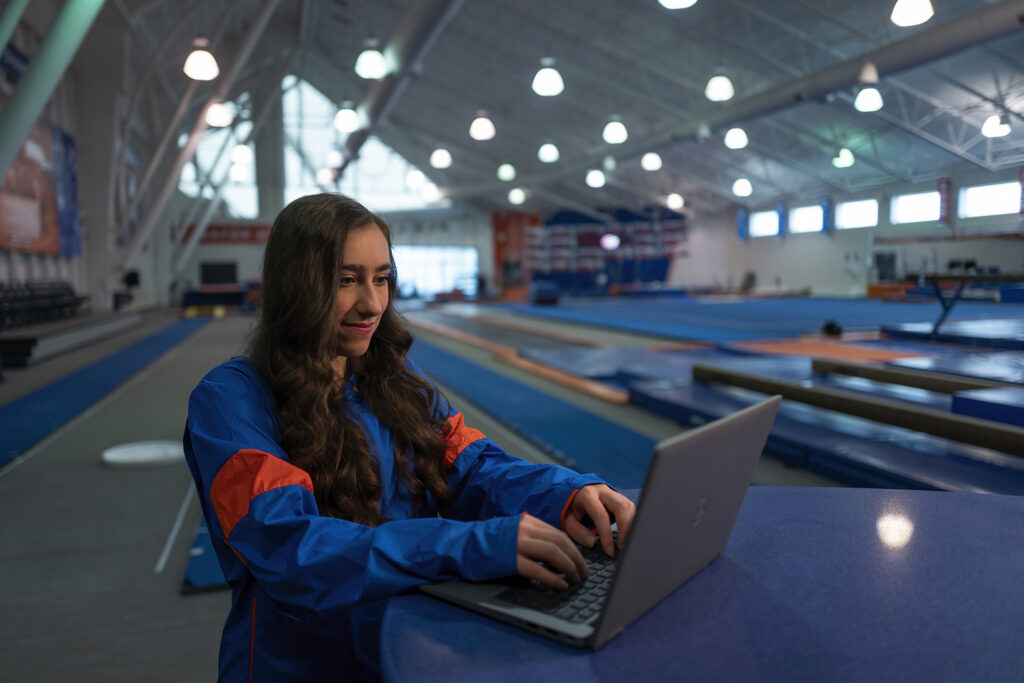
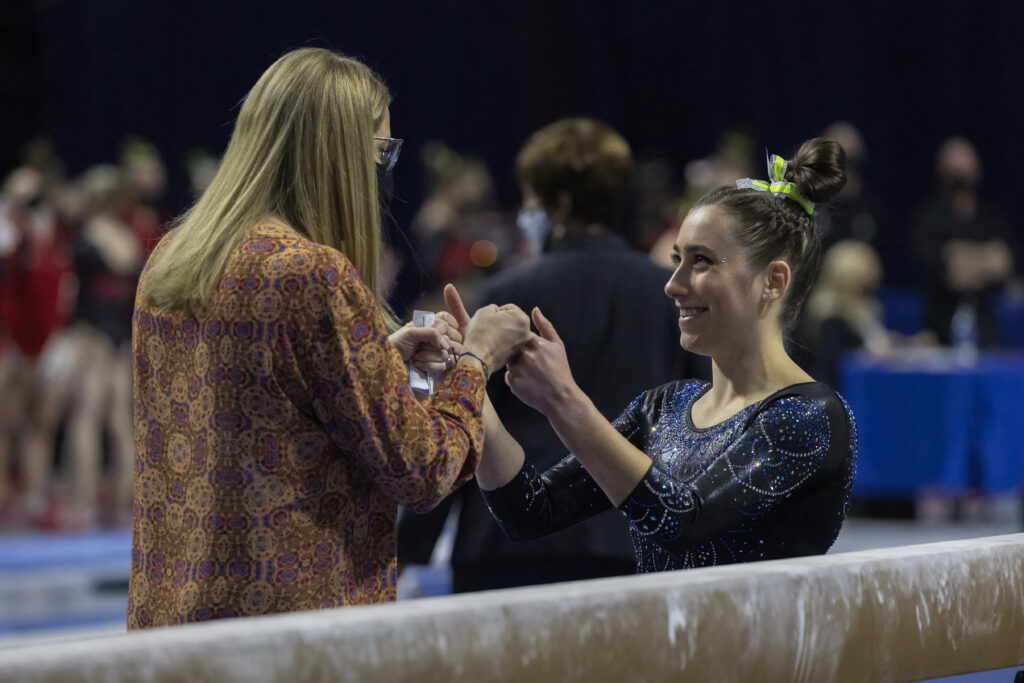
Clapper’s University of Florida gym has become a second home. It’s where she spends her days molding both her athletic and academic ability.
Clapper grew from the lowest of the gymnastics team hierarchy to a mentor. She sees herself in the young women who joined the team after her and continues to learn from them, just as they learn from her.
It might have come from years in the sport, it might have come from the athletic climate around her, but whatever it may be, Clapper’s consistency in leadership is extraordinary. It has been something UF coach Jenny Rowland noticed from the start. The confidence behind her smiles translates into an outstretched arm for those around her, even when she was the newbie of the team. Clapper has never shied away from speaking her mind in the gym. If a move isn’t working, she’ll say so.
Rowland makes sure her gym is a safe space every day. The coach has come to learn the balance in pushing a team to success and pushing it too far. She likes to believe the room she’s given Clapper to grow plays a part in the gymnast’s journey to where she is today.
Clapper’s heart lies with her team. Of all the accolades and all the memories, what’s happening in front of her is the most heart-tugging to think about. She’s performing some of her final competitions, experiencing some of her final days as a gymnast. The day she always thought would be her last is almost here.
After four years of bleeding for the team, one of the final goals remains: the SEC championships.
Back in Birmingham
Clapper leaves the bathroom and glides back to the floor, her stage for the night. “I got this,” she says to the team manager, not truly knowing who she needs to convince more.
She makes her way to the beam and flashes a smile at the judges. Deep breaths in and out, smile unfaded. A step forward and she is at arm’s length of the daunting apparatus ahead of her. Her shoulders rise with the breath inflating her chest and fall with a final exhalation of doubt. She shakes her head, mouthing a sharp “Calm.”
Fingers and hands sweep through the air, the artfully gentle motion a precursor to the raw exhibition of strength to follow. As she mounts the beam, hands gripped on top, a honed strength brings the rest of her body around to straddle it. Up she goes, guiding herself through the mount.
Toes point, and motions snap through the air. She defies gravity. Her smile makes it look easy. Choreography points keep her in line.
One, two, three. Straight, over the top. Over the top, press.
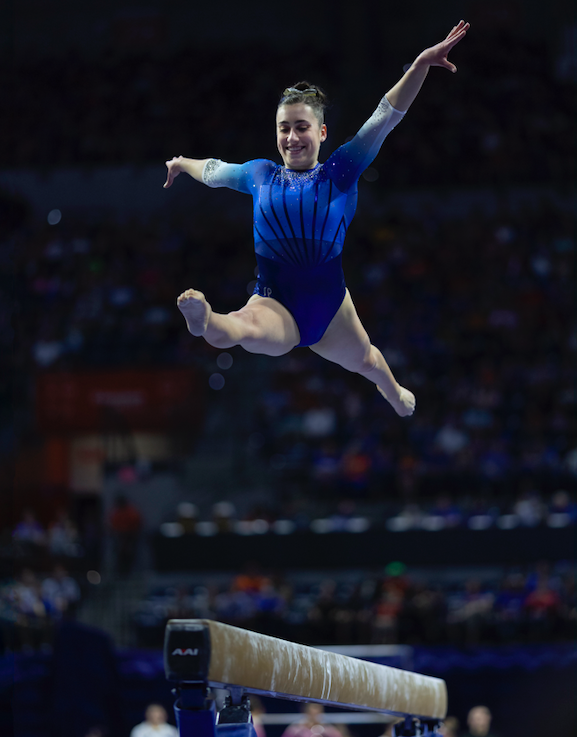
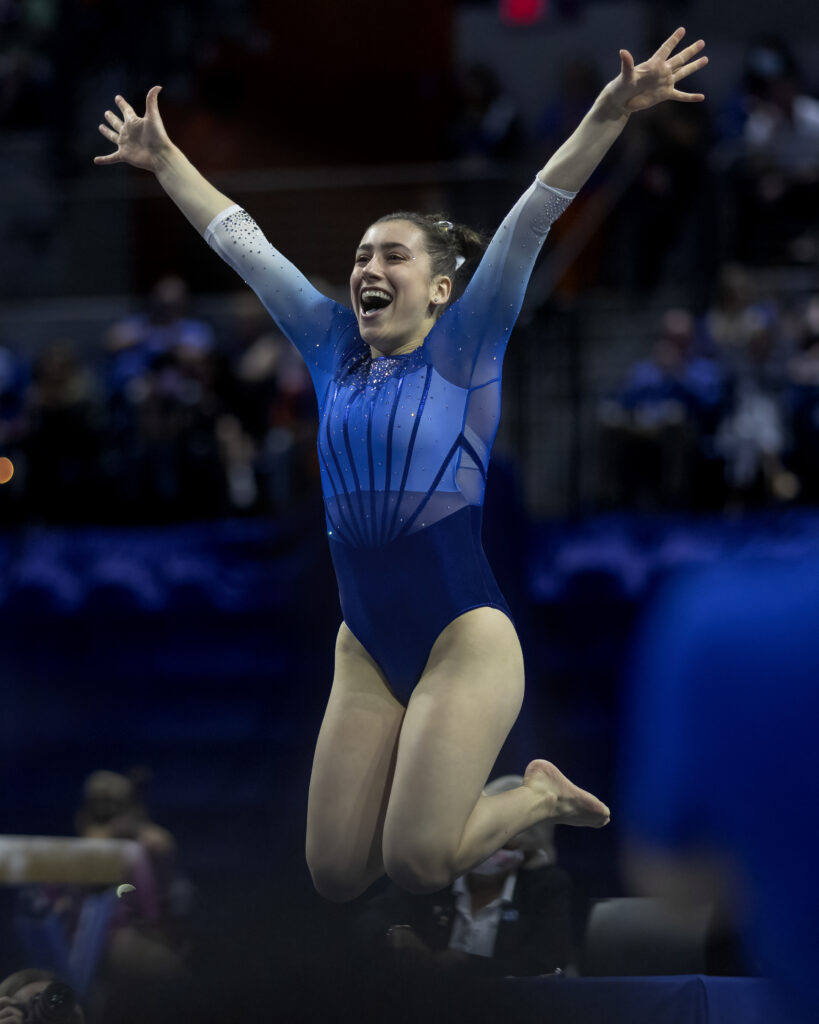
Clapper’s routine smiles started as a confidence booster when she was young.
In a blur of tumbling legs, swinging arms and bouts of gravitational pull, Clapper loses herself. Her thoughts at bay, her muscle memory and years of expertise do the work.
When she lets herself come back, she looks up to her score: “9.9.” She hears the cheers and savors the spotlight alongside her team. She knows she has come home.
Postscript
The University of Florida Gators brought home the 2022 SEC Gymnastics Championship title for the first time since 2016. Leah Clapper is now attending the University of Florida and competing on its gymnastics team for a fifth year to finish her studies and compete alongside her team.